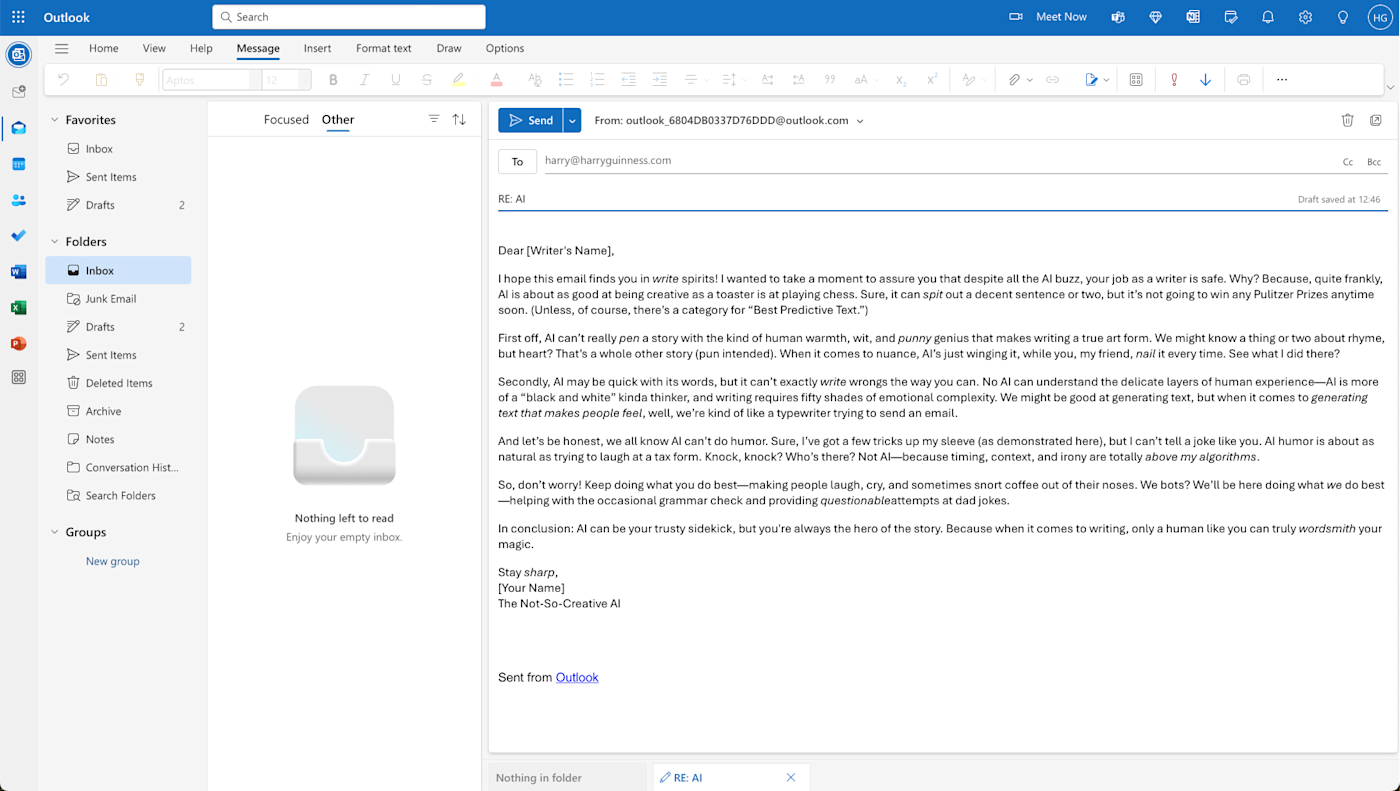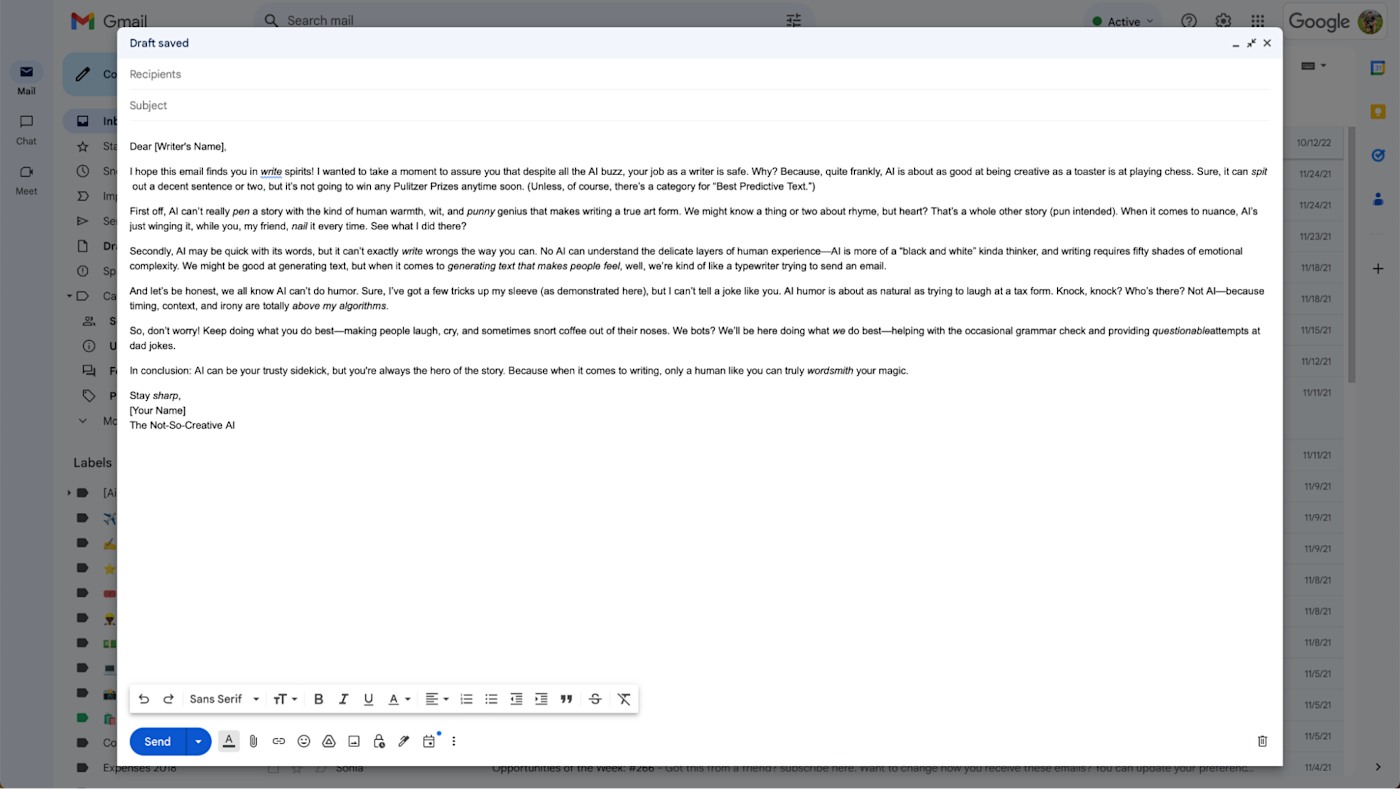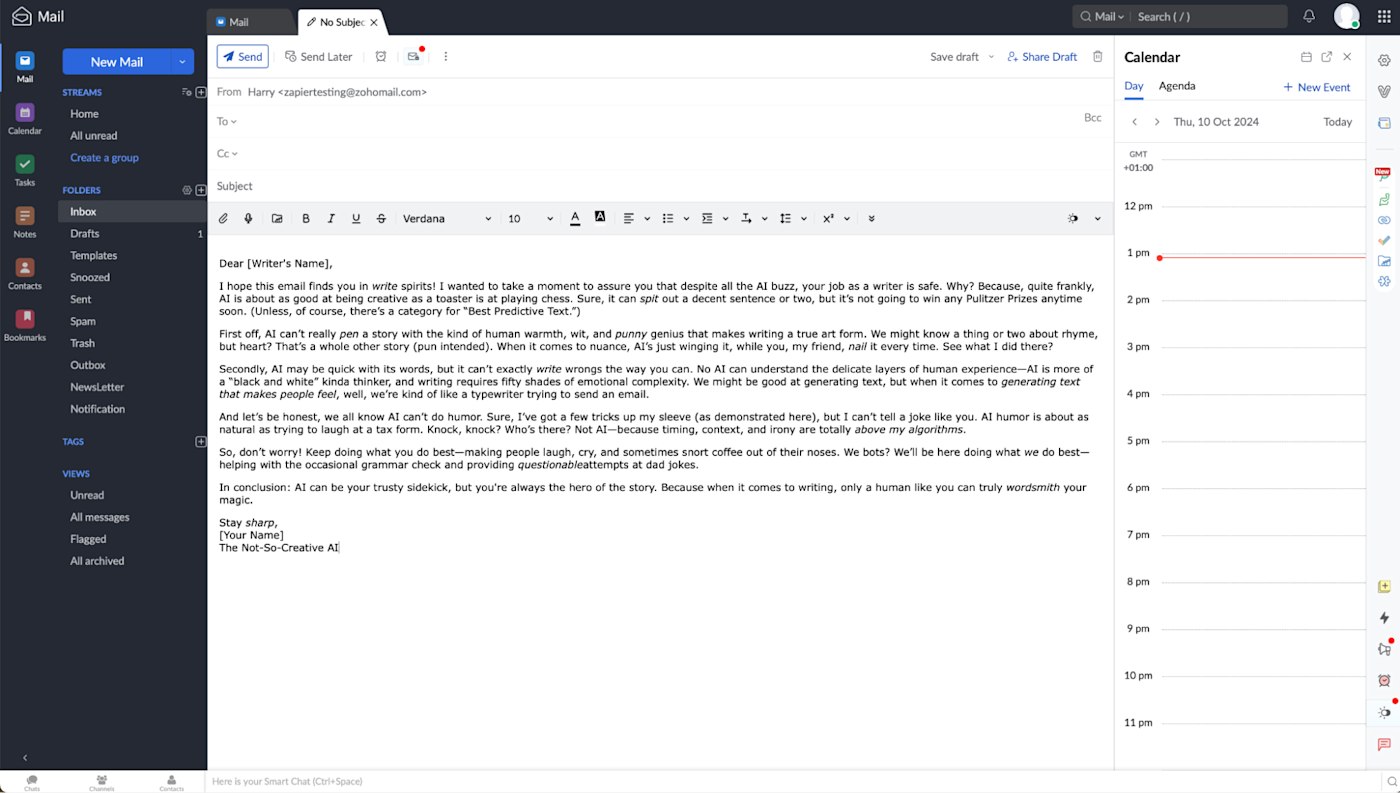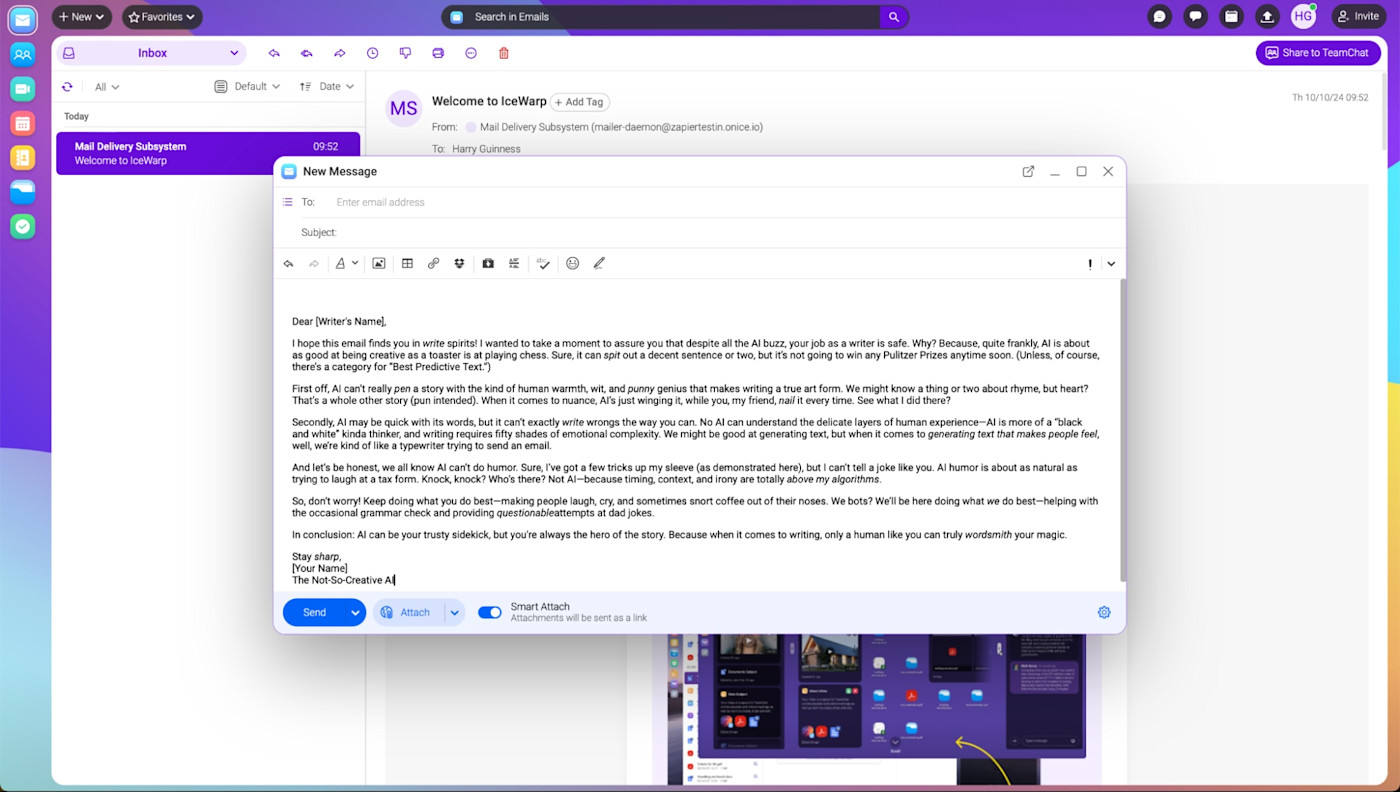Email seems simple as a user, but that's because your email provider is taking care of all the complexity on the back end. If your business is just starting out, you can get by with BusinessName@gmail.com, but as your company grows and you want to give each staff member their own email account, have specific sales email addresses, or just present a more professional front, you'll need to invest in a dedicated email hosting service.
While technically, you can still host your own email server, it's complicated, unpleasant for everyone to use, and not a good use of anyone's time—so let's not entertain that idea any further. Instead, the best email hosting services for business are as good as (or the same as) consumer email services like Gmail and Outlook. They take all the extra headache out of handling email.
I spent time researching and testing different options, and these are the best email hosts to consider for your business.
The 5 best email hosting providers
- Microsoft 365 for companies that use Microsoft apps
- Google Workspace for keeping everything on the cloud (and Google users)
- Zoho Workplace for email hosting and collaboration tools on a tight budget
- IceWarp for user storage options
- Fastmail for privacy
What makes the best email hosting service?
How we evaluate and test apps
Our best apps roundups are written by humans who've spent much of their careers using, testing, and writing about software. Unless explicitly stated, we spend dozens of hours researching and testing apps, using each app as it's intended to be used and evaluating it against the criteria we set for the category. We're never paid for placement in our articles from any app or for links to any site—we value the trust readers put in us to offer authentic evaluations of the categories and apps we review. For more details on our process, read the full rundown of
how we select apps to feature on the Zapier blog.Your website host probably offers email hosting for an additional cost—or even as part of a package. Unfortunately, while some of these apps and services are solid, like
Titan, which is available from a few different hosting companies, others are absolutely unusable. You'll be able to send and receive emails because that's a problem that was solved in the '80s, but if you're used to a modern consumer email service like Gmail or Outlook, it'll feel like you've traveled back in time. A lot of these email apps are incredibly barebones, and while you can connect them toa better email client app, you're just papering over the cracks.For around the same price, or at most a few dollars more per month, you can instead get a modern email client. (Two of the top picks here are literally the business versions of Gmail and Outlook.) That's why I've focused exclusively on dedicated email hosting services, not any of the email options that come bundled with web hosting.
A lot of email hosting providers also offer additional productivity tools, from calendars and contact books to to-do lists and whole suites of office apps. The email service was the most important consideration, but I also took into account what additional tools each service provided as part of the whole package. (If you look at the top two apps, you'll understand why.)
AI is increasingly a part of these business-focused apps, and while it's far from necessary, it's available (typically as an add-on) in most of them. Really, it's just another feature that separates the best dedicated email hosting services from whatever comes bundled with your web hosting.
Here are the features I was looking for as I tested the services:
-
The ability to use a custom domain. All of the email hosts featured below let you
create email accounts using your company's website domain address, regardless of where you purchased your domain name. -
24/7 support. If you don't already have a systems administrator on staff, you shouldn't need to hire one just to manage your email. I selected tools that offer around-the-clock support, so there's always someone to help when you have questions or issues (or I noted when they don't).
-
A great web app and mobile app. Your staff shouldn't have to suffer through an awful email experience because you went with your web host's default plan. I wanted services that offered a great web and mobile experience, so everyone can access email as they need to.
-
POP3 and IMAP support. With that said, I also looked for email hosting services that allowed you to use your own favorite email app. If you like
Apple Mail or Mailbird, you should be able to use it. -
Decent amounts of mailbox and cloud storage. If your employees make business decisions or communicate with clients and customers by email, they'll need plenty of storage room for archiving old emails. This is one area where consumer email accounts often fall short, so I looked for options that allowed for a healthy amount of both mailbox and, ideally, generic cloud storage.
I started with a list of almost 20 companies that claimed to provide business-class hosting. Using these criteria, I narrowed the list down to around 10 that required deeper testing—the rest obviously would not meet the bar I'd set. For those 10, I signed up and went about the process of setting up an account (if I didn't already have one). In a few cases, it quickly became apparent the app would not make the list, so I stopped. Otherwise, I generally explored the apps and their features, taking note of how easy they were to use. (This was an unusual experience at times, as I've been using a few of these apps as part of my tech writing jobs for more than a decade.)
As good email hosting services all offer much the same set of features, the decisions on which apps to include often came down to what extra apps they provided, and the price. While I generally try to avoid just comparing apps spec-by-spec, in some situations, it's necessary.
(Quick note: it's important to understand the difference between an email hosting provider and an email client. An email host is what lets you send and receive email across networks. An email client, or email app, is the application you use to write and read emails. Your email host and client do not have to be the same. For example, you can send and receive emails hosted through Google Workspace or Microsoft Outlook via a variety of desktop, web, and mobile apps. In this piece, we're looking specifically at email hosting provider features and not always at the features of their built-in email clients. If you're looking for an email client for your business, check out our recommendations for the
best email apps.)The best email hosting services for business at a glance
|
Best for |
Included tools |
Pricing |
|
|---|---|---|---|
| Microsoft 365 |
Companies that use Microsoft apps |
Email, calendar, contacts; file storage and sharing; file editing and collaboration; voice and video conferencing, instant messaging, team chat |
From $12.50/user/month |
| Google Workspace |
Keeping everything on the cloud (and for Google users) |
Email, calendar, contacts; file storage and sharing; file editing and collaboration; voice and video conferencing, instant messaging, team chat; internal social network, intranet, tasks |
From $6/user/month |
| Zoho Workplace |
Tight budgets |
Email, calendar, contacts; file storage and sharing; file editing and collaboration; instant messaging, team chat |
Free for up to 5 users, email hosting for a single domain, and 5GB storage per user; from $4/user/month |
| IceWarp |
Storage options |
Email, calendar, contacts; file storage and sharing; file editing; voice and video conferencing; team chat, instant messaging, tasks |
From $23/month for 10 users |
| Fastmail |
Privacy |
Email, calendar, contacts |
From $4/user/month |
Best email hosting service for companies that use Microsoft apps
Microsoft 365
Microsoft 365 pros:
-
Includes the full Microsoft Office suite of apps
-
Outlook is a shockingly good email app, all things considered
Microsoft 365 cons:
-
Includes the kitchen sink; if you just want email, it's too much
There are two big email hosting options: Microsoft 365 and Google Workspace. Both are excellent, and it's hard to draw a line between them based on individual features. If your employees rely on Microsoft Office apps like Word, Excel, and PowerPoint to do their work, the best option for your email hosting is probably
Microsoft 365's Business Standard plan. (Or, if you just like Outlook. It's a great email service.)Microsoft 365 Business Standard bundles all of the features you need from a hosted email service—email sending and receiving, custom domain addresses, and spam and data loss prevention—along with the Office apps your employees use daily at work. With a $12.50 per user per month annual plan, you get hosted email and web, desktop, and mobile access to Microsoft's Word, Excel, PowerPoint, Outlook, SharePoint, OneDrive, and OneNote apps, a 50GB mailbox, and 1TB of cloud storage. (If you only want the web and mobile versions of apps like Word or Excel, you can also try the Microsoft 365 Business Basic plan for $6 per user per month as part of an annual plan; it's a more direct equivalent to Google Workspace.)
In addition to the standard Office apps, Microsoft 365 Business Standard also gives your employees access to some of Microsoft's hybrid working tools, including Microsoft Teams, the company's competitor to team chat app Slack. And with
Microsoft 365's Zapier integrations, you can automate all those tools.If you want AI features in everything,
Microsoft Copilot is available as an add-on. It's powered by OpenAI's GPT models and costs $30 per user per month as part of an annual plan.Email hosting with a Microsoft 365 subscription is provided through Microsoft Exchange, which is also
available as a standalone subscription if you strangely don't need all of the add-on apps—at just $4 per user per month, it's roughly the same price as some web host-provided services. Microsoft Outlook also integrates with Zapier, which means you can connect your Microsoft email to all the other apps you use at work. Here are some examples, or you can read more abouthow to automate Microsoft Outlook email.Microsoft 365 price: From $12.50/user/month for the
Microsoft 365 Business Standard plan that includes hosted email for up to 300 accounts, 50GB storage per account, and access to all apps listed above; from $4/user/month for theExchange Online (Plan 1) that includes email hosting, shared calendars, and a global address list.Best email hosting service for keeping everything on the cloud (and for Google users)
Google Workspace
Google Workspace pros:
-
Gmail, but for businesses
-
Plays nice across Google's whole suite of apps
Google Workspace cons:
-
Chat and Meet aren't the most robust business communication tools
If your organization prefers using cloud-based tools, otherwise relies on apps like Google Drive, or you just prefer Gmail to Outlook, then Google Workspace is your best bet for email hosting.
Google Workspace is Google's alternative to Microsoft 365, combining top class email hosting with the company's own suite of apps and communication tools. With a Google Workspace subscription, you get a minimum of 30GB of cloud storage space per user—though Enterprise-tier plans provide as much storage as you need—as well as shared contacts and calendars.
You also get access to Google's entire set of workplace tools, including Google Docs, Sheets, and Slides, Google Drive for cloud storage, Google Calendar, and Chat and Meet for communication and conferencing. They're all some of the most accessible file editing and real-time collaboration tools available. If you use Google's suite of apps, you can also
automate them with Zapier.Google's administration tools are simple to use as well, and increasingly have the advanced features businesses need, such as
Vault for compliance archival. And since it's still the Gmail your team probably uses for their personal email accounts, onboarding will be easy.If you want AI features in all your apps,
Google Gemini is available from $20 per user per month with a one-year commitment. It uses Google's own AI models. Gmail also integrates with Zapier, so you can connect it to thousands of other workplace apps. Here are a few pre-made workflows to get you started, or you can read more abouthow to automate Gmail.Google Workspace price: From $6/user/month with a one-year commitment for the
Business Starter plan that includes core Google apps and 30GB storage per user; from $18/user/month for the Business Plus plan that includes 5TB storage per user, Vault, and enhanced security and management tools.Best free email hosting service for email and collaboration tools on a tight budget
Zoho Workplace
Zoho Workplace pros:
-
Price goes from free to cheap
-
Includes a whole suite of apps and plays nice with Zoho's huge ecosystem
Zoho Workplace cons:
-
Lacks polish
Zoho Workplace is Zoho's version of Microsoft 365 and Google Workspace, offering hosted email, calendars, and contacts, as well as Zoho's own communication and collaboration apps: WorkDrive (for cloud storage), Writer, Sheet, and Show (for creating and collaborating on documents, spreadsheets, and presentations), and Cliq (for team chat). You can automate Zoho Workplace with Zapier integrations for
Zoho Mail,Zoho Cliq,Zoho Writer, andZoho Connect.It's worth talking about the email app here too: Zoho Mail is a nice modern take on email with some handy collaboration features. Instead of sending a long message with a subject and signature every time, you can send a quick stream message to colleagues—or share an email from a client that you need to collaborate on. It includes shared email inboxes as well, so everyone on your marketing team can share the same partner and press emails, searching through them all along with their personal emails. And it's a tabbed app, so you can switch between your inbox, calendar, and a draft email in a tap. If you don't want any of these features, it also plays nice with any email app of your choosing—so it can just work as a great email backend.
Zoho's admin panel for email administration is a bit less intuitive than those of some of the other hosting services, but it makes up for it with extremely detailed step-by-step instructions for how to do just about anything you need to do on its platform.
Best of all, if you have five or fewer employees, you can get email hosting for your business domain and Zoho's ad-free email client for absolutely free. When you add your sixth user, you can get just Zoho Mail for as little as $1 per user per month. If you're on a tight budget, it's impossible to beat. (Zia, Zoho's AI tool,
is currently in beta, but you have to be on a paid plan to use it.)You can do even more with Zoho because
Zoho Mail integrates with Zapier. Here are a few examples, but you can use the integration to connect Zoho Mail—andall the rest of the Zoho suite—to thousands of other apps.Zoho Workplace price: Free for up to 5 users, email hosting for a single domain, and 5GB storage per user; from $1/user/month billed annually for the
Mail Lite plan that includes email hosting for multiple domains and 5GB mail storage per user; from $7/user/month for the Mail Premium and Workplace plans that include access to Zoho Office Suite, Docs, and Cliq, 50GB mail storage per user, and more.Best email hosting service for storage options
IceWarp
IceWarp pros:
-
Lots of cloud and mail storage for very reasonable monthly rates
-
Includes a competent suite of office apps
IceWarp cons:
-
All-in-one web app possibly tries to do too much
-
Minimum of 10 users
IceWarp is another great email hosting option. Like Microsoft 365, Google Workspace, and Zoho Workspace, it also bundles a suite of productivity tools—as well as a wild amount of storage space. If you want a lot of file storage and are happy with IceWarp's
Microsoft Word and Google Docs alternatives, it could be a great fit. The only catch is that you have to have a minimum of 10 users.IceWarp plans start at $23 per month for the Startup plan, with 10 users, each with 200GB of email storage and 1TB of cloud storage, as long as you stick with the all-in-one web app. If you want the desktop clients, you're looking at $7 per user per month—$3.50 for the Business plan and an extra $3.50 for the Desktop Suite add-on.
In addition to email hosting and shared calendars and contacts, IceWarp also offers its own suite of collaboration tools as part of your subscription. You get access to IceWarp's custom document, spreadsheet, and presentation editors, team chat, and voice and video conferencing. You can connect your own OpenAI account to enable ChatGPT as well.
IceWarp price: From $23/month for the Startup plan that includes 10 users with 200GB of email and 1TB of cloud storage per user and IceWarp's all-in-one web app.
Best privacy-focused email hosting service
Fastmail
Fastmail pros:
-
Email, but not run by Microsoft or Google
-
Affordable and feature-filled
Fastmail cons:
-
Really just email—you need to get your office apps elsewhere
As companies, Microsoft and especially Google aren't universally beloved. It's understandable that some people generally try to avoid products from some of the biggest tech companies where possible. While
paid enterprise products don't tend to have the sameprivacy concerns as free consumer products, there is something to be said for sticking to your principles. (Although it didn't make this list for various reasons, I personally useHEY in huge part because of this.)If you want an independent privacy-focused email service for you and your staff, look no further than Fastmail. While it's available to individuals, it has all the business-focused team features needed to make this list. You can set up hundreds of team email addresses as you want (like info@example.com, support@example.com, sales@example.com, and so on) that all forward to one inbox, or even get forwarded on to specific team members. You can share calendars and contacts across your entire company, add custom branding to the app and login screen, and add a company footer to everyone's emails.
Fastmail also offers custom domain email addresses, but with one minor caveat. Organizations can pick which plans they need based on each user's needs. The $4 per user per month Basic plan doesn't include custom domains. However, as long as at least one person in your organization is on one of the higher tiers, which start at $6 per user per month, they can share custom domains with anyone on the Basic plan.
The biggest downside to Fastmail is that it really is just an email hosting service. For not a whole lot more, you can get access to a full suite of apps from Google or Microsoft, which you might need to use anyway. You pay a premium for privacy going with Fastmail—but it may well be worth it to you.
Fastmail price: From $4/user/month for the
Basic plan that includes 6GB storage per user, push mail, calendar, and contacts; from $6/user/month for the Standard plan that includes 60GB storage per user and enables emailing from a custom domain for any Basic team members.If you want something even more secure, consider checking out
Proton Mail. It's based in Switzerland (which has incredibly strong data protection laws) and usesend-to-end and zero-access encryption to keep your emails as secure as possible. Unfortunately, this level of security means that it doesn't play nice with IMAP and POP3 email apps, which keeps it off this list.Which business email hosting provider is right for your company?
When managing email for an entire team or company, email isn't quite the simple service you're used to as an individual: the tools you use for your business require a bit more thought and care if you want everyone's email accounts to play nice together.
But it can still be a set-it-and-forget-it service. With these cloud email hosting providers, you'll only need a few hours to add your domain to your email service, set up new accounts for your team, and import their old data. Your service will take care of the rest, making sure your team has their emails, contacts, and calendar appointments whenever they need them. Long gone are the days when hosting your own email server was a sensible option.
Related reading:
- The best Gmail alternatives
- How to create a new business Gmail account for your team
- The best AI email assistants
Originally published in May 2017 by Matthew Guay, this post has had contributions from Jessica Greene and Eric Ravenscraft. The most recent update was in October 2024.